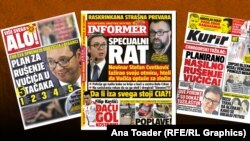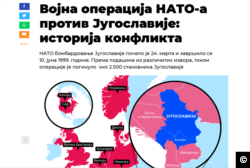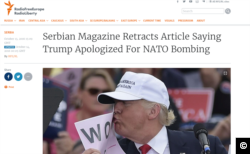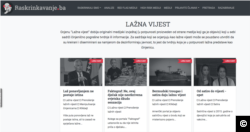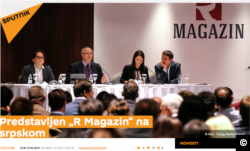[Editors note: Correction and clarification. This version of the story corrects the reference to B92, the fact that in functions today mostly as a web portal. We also clarify that the publication Nedeljnik carries a Russian state media advertising insert that runs in many media outlets].
Sputnik Srbija leads the ratings for political disinformation among Serbian-language foreign media operating in the Balkans, according to an upcoming report by the fact-checking organization Raskrinkavanje.ba, based in Bosnia and Herzegovina (BiH). The report, which will be released on May 13, found that the Belgrade-based Russian government-owned international broadcaster is part of a disinformation hub that targets Serbian language audiences in Bosnia and Herzegovina, Serbia, Croatia, Montenegro and Kosovo, according to Darko Brkan, director of Raskrinkavanje.ba (Disclosures). In contrast, the Serbian language services of the Voice of America, Radio Free Europe/Radio Liberty, Deutsche Welle and the BBC did not even show up in the disinformation algorithm.
According to President Vladimir Putin, when the Russian government designed its foreign broadcast media project back in 2005, it intended to “try to break the Anglo-Saxon monopoly on the global information streams.”
In the Serbian-speaking part of the Balkans, Putin’s strategy seems to have succeeded.
Few people in the Balkans appear to know that Sputnik and Russia Today are Russian government-owned broadcasters, as their information is widely republished by local news outlets. Sputnik Srbija presents itself as a local media outlet that claims to cover topics others do not. In addition to producing original stories, it transmits content from RT, which does not broadcast in the Serbian language.
As Polygraph.info has frequently noted, Russia Today and Sputnik are far from being regular media outlets. According to media watchdog organizations, they were created to serve as the Kremlin’s information arm abroad.
Polygraph.info video by Nik Yarst.
More problematic, however, are the means these two organizations use to serve Moscow’s goals—not through independent journalistic reporting, but mainly through disinformation. By mixing fact and fiction, playing on popular sentiments among foreign audiences and trying to sway public opinion in a particular direction that serves Moscow’s interests, these two organizations systematically pursue the Kremlin’s geopolitical goals, while discrediting journalistic principles in the process, according to Precious Chatterje-doody of Manchester University in the U.K.
Sputnik in Serbia
Sputnik set up a sizeable operation in Serbia in 2015, which continues to expand. It just moved to bigger premises in Belgrade, hiring more journalists – allegedly, even reporters who used to work for Radio Free Europe/ Radio Liberty.
Its editor-in-chief, Ljubinka Milinčić, served as Serbia’s cultural attaché in Moscow in the early 2000s, where she developed a fascination with President Vladimir Putin and subsequently dedicated several books to him. One of them, titled Vladimir Putin - Moja Bitka za Kosovo (Vladimir Putin – My Fight for Kosovo) was published in Serbian in 2007, while another, titled Fenomen Putin - Covek Koji Je Stvorio Sam Sebe (The Phenomenon of Putin - the Man Who Created Himself), was published in 2011.
Under the slogan “Sputnik Tells the Untold,” the Moscow-launched news portal and radio program reaches large Serbian-speaking audiences as well as people in Bosnia and Herzegovina, Montenegro, Croatia and Kosovo, who understand Serbian.
The well-funded Kremlin media effort benefits from the predicament of Serbia’s cash-strapped news outlets, which are ready to republish free content to save money. And Sputnik’s stories, though widely seen as biased and misleading, are readily available for free distribution through numerous radio and TV stations throughout the Balkans, according to Jelena Milić, director of the Center for Euro-Atlantic Studies (CEAS) in Belgrade.
“Serbia has too many media outlets that are not financially viable,” Milić told Polygraph.info. “Some of them serve as fronts for political influence and it suits them to have free-of-charge media production that favors Russia. Others simply don’t pay attention to the accuracy of Sputnik’s stories. This allows the content of Sputnik and RT to proliferate in all Serbian media, turning it into a disinformation hub.”
Disinformation Proliferation
Milić said that the most underestimated problem with Russian influence and disinformation in the region is the high-level of penetration of Sputnik Srbija in the local media environment, especially through popular radio stations. Sputnik’s news production has replaced all news broadcasts at the top of the hour as well as the main daily news and analysis broadcast of Radio Novosti and other stations in Serbia. In reality, there is no original news reporting by these stations–it is outsourced to Sputnik Srbija.
One of Sputnik’s main platforms is the B92 web portal, the successor of once-legendary Serbian radio station that earned awards for independent broadcasting during the final years of the Milosevic regime. RTV B92 today functions mostly as a web portal and operates Play Radio and O2.TV.
Another one is Studio B, which found itself in a difficult financial position after Western media assistance dried up. The radio station re-broadcasts Sputnik programs, along with those of U.S.-funded Radio Free Europe/Radio Liberty and Germany’s Deutsche Welle. This creates confusion among Studio B’s listeners: they can receive two completely different versions of the same event depending on the hour of the day they listen to the radio.
“You have two diametrically opposed points of view,” said Ivana Vucicevic, editor-in-chief of Studio B, in a May 2017 Reuters article. “That way we can satisfy the broad spectrum of people who listen to us.”
For example, on the 20th anniversary of NATO’s military operation in Yugoslavia to prevent Slobodan Milosevic’s regime from killing and ethnically cleansing the Kosovo Albanians, Sputnik portrayed NATO’S intervention as an act of aggression against the Serbian people. Sputnik is currently running a 79-days campaign to commemorate each day of NATO’s intervention, under the slogan “Serbia Remembers.” The production uses a multimedia platform, combining online writing and graphics with audio and visual materials for a stronger effect.
This content has been widely broadcast by many local news outlets, amplifying Sputnik’s influence on the Serbian public. As a result, even if the country’s leadership wanted to move on from the painful spring of 1999, improve relations with Kosovo and join the European Union, the popular opinion shaped by the local outlets transmitting Sputnik’s content could become an obstacle, according to Milić.
Ready to Rectify
“The media in Serbia and Republika Srpska have been compromised by political and economic pressure and they have become susceptible to Sputnik’s influence,” said Ivana Cvetkovic Bajrovic, Associate Director for Europe at the National Endowment for Democracy. “The political environment created by the leaders is not conducive to critical thinking about what that influence might mean.”
Bajrovic told Polygraph.info that on the other side is the economic pressure -- the need to drive traffic to media websites. It is all about attracting visitors to the websites, often by packaging fake news to increase traffic and revenues. “But when confronted about publishing disinformation, many news outlets seem ready to rectify the situation and take down the post. This has been the experience of the Bosnian fact check website Raskrinkavanje.ba https://raskrinkavanje.ba/,” Bajrovic said.
The study by Raskrinkavanje.ba has identified a disinformation hub that targets the Serbian-speaking populations in the Balkans and covers Serbia, Montenegro, Croatia, Bosnia and Herzegovina, and Kosovo, according to Darko Brkan, director of Raskrinkavanje (Disclosures). The group has identified 30 outlets, mostly from Bosnia and Herzegovina and Serbia, as sources and carriers of disinformation. One of them – Sputnik Srbija – is foreign, but two of the key local sources of disinformation are funded by the government of the BiH entity Republika Srpska—the Radio Television of Republika Srpska and the News Agency of Republika Srpska (SRNA). Moscow has long supported the government in Banja Luka, with the cooperation intensifying lately in the defense sector as well.
“Apart from direct disinformation practices, Sputnik has had a clearly biased reporting of BiH politics, our analysis showed,”Brkan told Polygraph.info. “It is mostly demonstrated through a positive attitude toward the Alliance of Independent Social Democrats (SNSD), the ruling party in Republika Srpska, and its president, Milorad Dodik. Sputnik was also one of the media outlets advocating for the SNSD party during the election campaign in 2018.”
Sputnik Narratives
According to Jelena Milić, the Russian broadcaster’s key mission in Serbia is to deconstruct the established narratives concerning Serbia’s responsibility for war crimes committed during the Yugoslav conflicts, and thus negate the rulings of the International Criminal Tribunal for the former Yugoslavia (ICTY). It also aims to deepen the sense of victimhood that is deeply rooted in the Serbian society with the purpose of alienating it from the West.
The narratives offered by Sputnik and multiplied in the local media include:
- The NATO bombing of Yugoslavia in 1999. Sputnik plays heavily on the anti-Western sentiments of the Serbian public that peaked during NATO’s bombing of Yugoslavia in 1999, while omitting the crimes Milosevic committed against the Kosovo Albanians.
- Depleted Uranium Pollution. Russian officials and Sputnik Srbija have repeatedly claimed that the use of depleted uranium munitions during the 1999 NATO intervention has led to contaminated soil and water and caused a surge in cancer rates, despite the claim being refuted by the United Nations Environmental Program in 2001 and 2002.
- Kosovo is Serbian Land. This topic is a staple in Sputnik’s programs, which frequently quote commentators as saying that Kosovo should be returned to Serbia’s jurisdiction.
- Denying the Rulings of The Hague. Another tactic of Sputnik Srbija is to call into question verdicts of the Hague Tribunal. It often provides a forum for convicted war criminals such as Vladimir Lazarevic, the former commander of the Pristina Corps of the Yugoslav Army, and Nikola Šainović, a close Milosevic ally, both of whom have served their sentences in The Hague.
- Anti-EU Rhetoric. Sputnik’s anti-EU rhetoric is more careful, as Belgrade has repeatedly stated that it intends to join the EU while remaining Russia’s partner.
Moscow’s Influence - an Advertising Insert
The Russian government also spreads its influence in the print media in Serbia, as it does elsewhere in the world, by placing paid supplements or inserts in local media. One of them is R Magazin, is an 8-page paid insert, included in the widely-read weekly Nedeljnik ten times a year.
The supplement is funded by the Russian government and prepared by Russia Beyond the Headlines, a multilingual resource on Russian politics and culture sponsored by Rossiyskaya Gazeta, Russia's state newspaper.
The insert, or similar ones, appear in other newspapers worldwide, including the Washington Post as RT noted, at time in 2006. More recently, Western publications, including the New York Times, have faced criticism for publishing the broadsheet inserts published by the same entite
The operation ultimately failed. Yet, R Magazin praises Dogadin for standing with a grenade launcher in front of a column of British tanks when NATO forces approached the airport.
New York-based journalist Marija Šajkaš reported for the Committee to Protect Journalists that all material appearing in R Magazin, including Serbian language articles and photographs, are delivered from Moscow and that the management of Nedeljnik has no influence over the supplement’s content.
Nedeljnik Managing Editor Marko Prelevic stated that, in the print edition, the supplement is clearly identified as sponsored content and so his editors do not verify the R Magazine content, but that “most of the ‘issues’ of R Magazine have almost no political content.”
However, an insert featured a March 29 interview with Russian paratrooper Alexei Dogadin from the 2nd Russian peacekeeping battalion stationed in Bosnia and Herzegovina during the Kosovo crisis in 1999, who participated in “the famous march on Pristina” in June 1999 when his battalion made its way from Tuzla to Kosovo in an attempt to seize the Pristina airport.
The attempt ultimately failed, because Hungary, Romania and Bulgaria closed their airspace for Russian airplanes heading to Pristina to complete the takeover. This critical fact is omitted in the article. Yet, R Magazin praises Dogadin for standing with a grenade launcher in front of a column of British tanks when NATO forces approached the airport in Pristina.
The article was visible in the online version of the newspaper, initially, but appeared later to have been taken offline. Prevelic said R Magazine articles "are seldom published on our website."
Prevelic said he believes the insert “was actually promoting the popular Russian movie that featured some Serbian actors.” He said that “(Russia Beyond) offers the most interesting reading materials on Russia and its rich history, the science breakthroughs and technology, the culture and the reportage from the largest country in the world.”
However, Šajkaš said the March 2016 issue “included analysis about why Russia is the winner in the Syrian war and a memoir by a Russian war correspondent on the 1999 NATO bombing campaign that hit civilian targets in Serbia.”
The Responsibility
Russian disinformation is burgeoning in the Serbian-language media space because of the lack of critical thinking among many politicians and some of the Serbian-language audiences about the sources of news and the implications of false narratives, according to Bajrovic.
Adnan Huskic, president of the Center for Election Studies in Bosnia and Herzegovina, says that the absence of a strong media makes it easier for political elites to use disinformation in order to maintain control. “When you don’t have… properly developed media systems in your country that are supposed to provide an unbiased and professionally ethical journalism… then we have a huge problem,” he said at a recent Atlantic Council event.
Milić argues that Serbia and other Western Balkan countries are particularly vulnerable to fake online information as their democratic systems are still fragile, including the rule of law and independent media.




